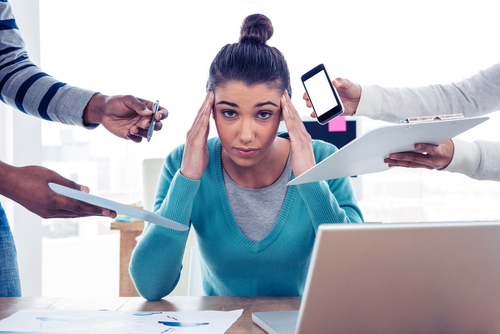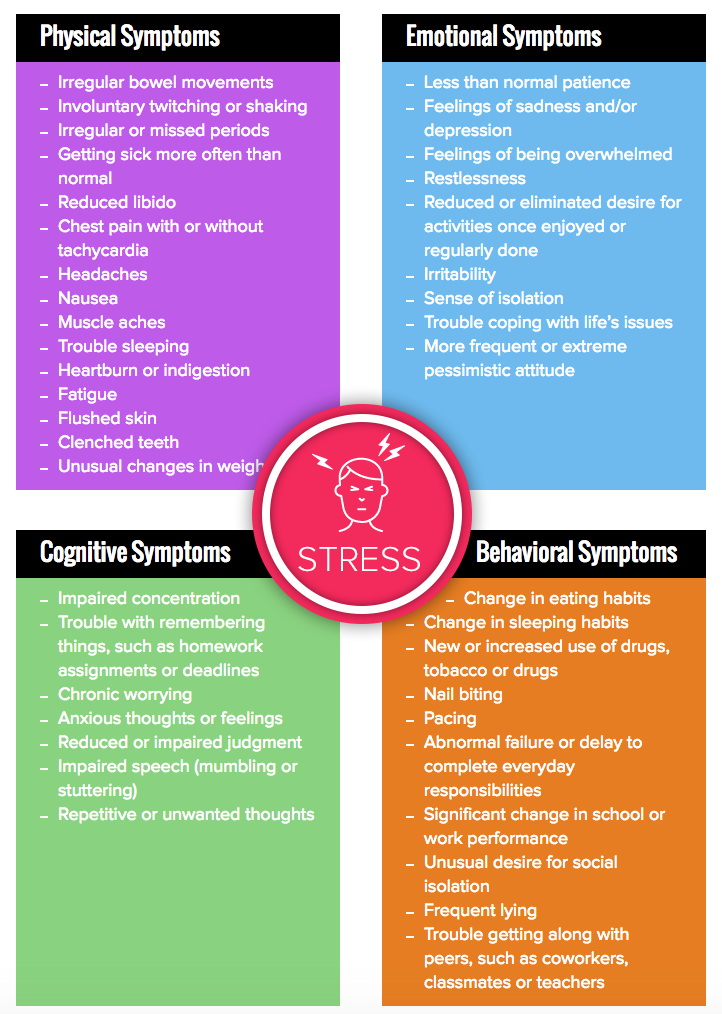By: Tayler Glenn
The day begins just like always. You step out of bed, grab a healthy breakfast, grab your coffee mug, and you’re out the door! But, as soon as you open your inbox you see an email about a work crisis that’s fallen into your lap. Your heartbeat quickens, you feel sick to your stomach – sound familiar?
Stress and anxiety are common experiences for most of us in our day-to-day lives. These feelings of stress and anxiety are more than just problems occurring in your mind; they affect us on a physical and emotional level, too! Fortunately, there are a number of simple techniques you can use to combat stress and anxiety before they become chronic problems.
Why are stress and anxiety important to manage?
Over 70% of adults in the United States say that they experience feelings of stress and anxiety on a daily basis. While some acute stress can be a good thing (think of the excitement you feel before a big event!), other types of acute stress (episodic and chronic) can build-up and have a negative impact over time.
To be frank, living with high levels of stress and anxiety means you’re putting your entire well-being at risk. These negative feelings wreak havoc on your emotional, mental, and physical wellbeing by narrowing your ability to think clearly, function effectively, and enjoy the positive things in life. Here are the signs and symptoms to look for:
Of course, the goal is to live a life that balances your overall wellbeing with work, relationships, relaxation, and fun! Stress management is not one-size-fits-all, so it’s important to experiment and find out what technique or techniques work best for you. Try out some of our favorite techniques below:
Stress and Anxiety Management Tips:
Mindfulness
Mindfulness is becoming more popular as research continues to show that it helps combat the anxiety-inducing effects of negative thinking. A recent study in college students even suggests that mindfulness may help increase self-esteem, which in turn lessens symptoms of anxiety and depression. It’s become a pretty broad term, but it simply describes practices that anchor you to the present moment! There are several methods for increasing mindfulness, including:
- Mindfulness-based cognitive therapy
- Deep breathing
- Yoga
- Meditation
- Tapping
- Forest bathing
If you need somewhere to start, find a comfortable, quiet space and try the simple steps for Deep Breathing listed below:
1. Sit with eyes closed breathe naturally, preferably through the nostrils.
Be aware of the sensation as the air you breathe enters and leaves your nostrils.2. Place one hand on your belly, the other on your chest.
Take a deep breath for a count of four, hold for a count of three, then exhale for a count of four.
The hand on your belly should go in as you inhale, and move out as you exhale.3. Concentrate on your breath and let other thoughts come and go.
If you discover that your mind has wandered, simply return focus to your breath.
Mindfulness can be tough to learn. If you don’t seem to “get it” the first time, keep trying! Mindfulness is different for everyone, and it will take some time for you to figure out what it means for you.
Exercise
Exercise is hands down one of the best ways to naturally reduce stress and anxiety! It’s nature’s best anti-anxiety remedy. Besides clearing the mind, firing up those feel-good endorphins, and helping you sleep soundly at night, research has found that individuals who exercise regularly were 25 percent less likely to develop an anxiety disorder within five years!
You don’t need to be an elite athlete to reap the benefits of physical activity – adding in 30 minutes of regular activity is really all you need! While just about any form of physical activity can help burn away the feelings of stress and anxiety, rhythmic activities are especially effective. Of course, the first step is to get yourself up and moving! Here are some easy ways to incorporate exercise into your daily schedule:
- Walking
- Running
- Swimming
- Dancing
- Cycling
- Tai chi
- Yoga
- Pilates
Whatever you choose, make sure it’s something you enjoy so you’re more likely to stick with it!
Clean Up Your Diet
Don’t get us wrong – we love that getting active and being mindful are such great tools for combating stress and anxiety, but they do steal the spotlight! Diet is often overlooked as part of the stress-fighting picture, but it serves a vital role. Staying hydrated, eliminating processed foods, and eating a healthy diet rich in complex carbohydrates, produce, and lean protein is the recipe for stress success, but why?
“Eating a healthy diet can reduce the negative effects of stress on your body,” said Matthew J. Kuchan, Ph.D., a senior research scientist at Abbott. “Emerging research is now suggesting that the gut microbiome can influence the body, including the brain.”
The typical Western diet is filled with refined sugars and carbs, unhealthy fats, and processed snacks. Can you imagine what that does to a body and brain trying to find the nutrients to support your busy lifestyle?Add unpredictable blood sugar spikes, dehydration, and chemical preservatives and you’ve got a recipe for microbiome disaster.
Hectic schedules make cooking meals at home sound like more of a chore than anything else, but taking time to stash healthy snacks and setting aside time to meal prep are helpful habits to create. Your anti-stress and anxiety diet can be supported by consuming foods that support a level blood sugar and healthy microbiome such as:
- Beans
- Yogurt
- Fatty Fish
- Kombucha
- Sauerkraut
- Peppers
- Leafy Greens
- Calcium-fortified foods
- High-Antioxidant foods
Cutting out or cutting back on sugar, sodas, and caffeine are also quick + easy changes to consider. Not only will your body be better-equipped with the proper nutrients to manage the effects of stress and anxiety, but you’ll probably find that you’re feeling more upbeat and energetic, too!
Be Social!
No, Instagram doesn’t count.
Strong relationships to others serve as social support networks that can reduce feelings of stress and anxiety when the going gets tough! While negative feelings can make us feel like we’d rather avoid other people, reaching out to friends and family can actually help by providing support and helping us put things into perspective.
Studies show that being part of a social support network gives you a sense of belonging and self-worth, which can be what makes the biggest difference when you’re facing tough times. One study actually found that spending time with friends and children helps stimulate the “tend and befriend” response which is the opposite of the fight-or-flight! You don’t need a huge network of friends and family to benefit from social support, so don’t worry if you tend to be more introverted.
Which of these tips help you reduce stress and anxiety?










Comments (0)